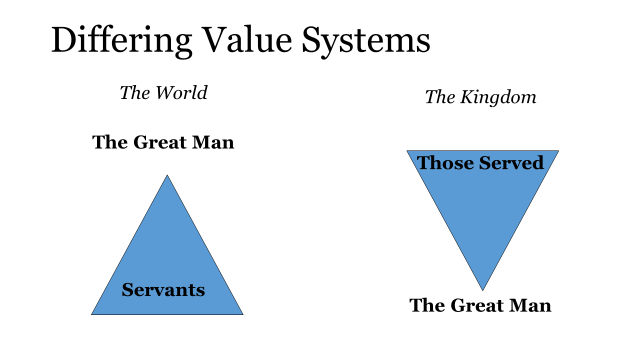One of the most profound stories in the scriptures is that of Joseph in Egypt. It tells us a valuable lesson about leadership.
In Genesis 41 the Pharaoh had a dream no one could interpret. Then he was told of an imprisoned Hebrew who could interpret the dream.
Which Joseph did. The seven fat cows and the seven skinny cows represented seven years of abundant harvests followed by seven years of famine. The same was true of the second dream featuring stalks of grain.
Two important principles about leadership come from this story.
 The first is the wisdom of anticipating the future and planning for it, in this case by saving. Pharaoh had the insight to put Joseph in charge of all of Egypt. Joseph knew that to survive the coming famine, they had to save and store the grain from the bountiful years so the people might eat in the years of famine.
The first is the wisdom of anticipating the future and planning for it, in this case by saving. Pharaoh had the insight to put Joseph in charge of all of Egypt. Joseph knew that to survive the coming famine, they had to save and store the grain from the bountiful years so the people might eat in the years of famine.
This principle of saving, or delayed gratification, is one of the gifts of the Jews that has blessed the world. People and nations that practiced this principle have flourished.
Until this moment in history, people had lived day to day, devouring what was before them. In a bountiful year they celebrated and consumed with no thought of tomorrow. To this day such an approach to life remains a major cause of poverty. People who understand the principle of delayed gratification and thrift will save for the future and are much more likely to avoid poverty.
The Protestant work ethic says we should work hard, save as much as we can and give as much as we can. More than anything else, this practice has led to economic flourishing. Go here to learn more about this ethic.
True leadership: others before yourself
The second leadership principle from Joseph’s story captures another mark of a great leader: thinking of others before thinking of one’s self.
Ungodly leaders think of themselves before they think of their people.
The Jewish cultural commentator, radio host and OT commentator Dennis Prager captures this point in his commentary on Genesis. Regarding Genesis 41:37, “The plan pleased Pharaoh and all his courtiers,” Prager says
That Pharaoh immediately believed his dreams were about Egypt, not about himself, marks him as a great leader. Great leaders—and Pharaoh’s behavior throughout this episode shows him in a very positive light—put their people’s concerns above their own. It is one reason great leaders are rare.”[1] [emphasis added]
Prager has recognized the principle of servant leadership. The great leader is a servant. Great leaders put the welfare of others above their own. We see this taught and practiced by Jesus.
In Mark 10:33-34, Jesus tells his disciples he’s going to die. Afterward, two of them approach with a request: “Jesus, when you enter into your glory, we want to be at your right and left hand.” He’s just told them he’s going to die, but there’s no place in their mind for him dying. What’s in their mind? He’s going to be king. He’s going to ride into Jerusalem carrying a sword. He will throw out the occupying Roman army and set up a political kingdom, and they want to reign with him in power, at his right and left hand. They want to be the secretary of state and the secretary of war. They want power.
The world’s approach to leadership is upside down
They had been with Jesus three years, watched his life, witnessed how he treated people, heard his teaching, and they still didn’t understand. They thought the kingdom was about power. The other disciples were indignant at this posturing: James and John had beat them to the punch.
We see what follows in Mark 10:42-45:
And Jesus called them to him and said to them, “You know that those who are considered rulers of the Gentiles lord it over them, and their great ones exercise authority over them. But it shall not be so among you. But whoever would be great among you must be your servant, and whoever would be first among you must be slave of all. For even the Son of Man came not to be served but to serve, and to give his life as a ransom for many.”
 Jesus contrasts the world and the kingdom. The world regards the person with power and authority as great. But Jesus said the kingdom of God has a different value system, upside down from the world’s. Actually, the kingdom of God is right side up; the world’s value system is upside down.
Jesus contrasts the world and the kingdom. The world regards the person with power and authority as great. But Jesus said the kingdom of God has a different value system, upside down from the world’s. Actually, the kingdom of God is right side up; the world’s value system is upside down.
This is the biblical principle, the kingdom pattern—servanthood. “Even the Son of Man came not to be served, but to serve.” He could have come to the emperor’s palace in Rome and demanded the service of everyone in the Roman empire. But he didn’t come for power or worldly authority. He came “to serve and to give his life a ransom for many.” The King of kings, the Lord of lords is servant of all. Why? Because he is God! Servanthood is rooted from eternity in the character of the living God.
Not so among you!
The world and the kingdom of God, two value systems. The world sees the one with the most servants as greatest. “I want to be the president of the country, president of the biggest corporation.” Or, “I want to have a large church.” We worship prestige and power. But, Jesus says, “not so among you.”
I am indebted to my friend and co-founder of the Disciple Nations Alliance Dr. Bob Moffitt for the development of this theme. Bob has said,
It was because Jesus was voluntarily and sacrificially willing to be a servant that God exalted him with the ultimate expression of glory. He has been given the highest position that could be given. He has been given a name that supersedes every name. Every tongue will confess that this servant is Lord. This is exaltation greater than any being has had or will have.
Therefore, God honored Jesus in this exalted manner because Jesus fully reflected what God intended when he created man. When God created man, he created beings who were other focused, not self-focused. Jesus fully expressed the highest expression of God’s image — voluntary and sacrificial servanthood. This is the highest expression of the image of God.
For more on the concept of a great leader read Servanthood: The Calling of Every Christian.
Today, nations are confronted with a catastrophe of a proportion similar to Egypt’s in Joseph’s day. Are the leaders of your nation using the crisis to accumulate power for themselves, or are they seeking ways to serve their people? Look for those who put the needs of their people first, not simply rhetorically, but in tangible ways. Do not simply look at what a leader says but what he does.
- Darrow Miller
[1] Prager, Dennis. The Rational Bible: Genesis . Regnery Faith. Kindle Edition.







2 Comments
Paul Wilson
September 21, 2020 - 8:53 am25 years ago I used the two similar triangles to contrast my proposed leadership to conventional leadership. I was interviewing for an administrative position (associate dean) in a college of a major public university. Let’s just say that the “Kingdom” triangle did not go over very well; but it did generate some good discussion in the Q&A after my seminar. In God’s gracious plan, I did not get the job.
admin
September 21, 2020 - 10:41 amHi Paul
It is definitely counter intuitive to the worlds way of thinking. But the concept is rooted in the nature of God’s character and in the teaching and manifestation of Christ.
Thanks for your comment.
darrow